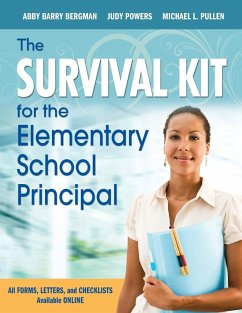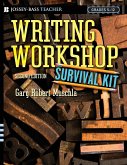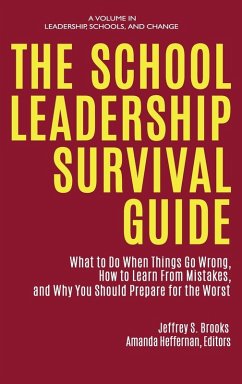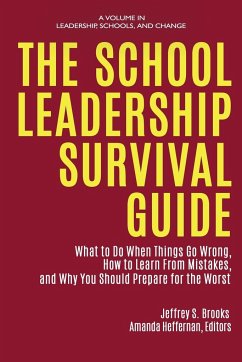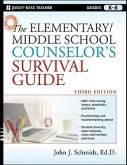Abby Barry Bergman, Judy Powers, Michael L. Pullen
The Survival Kit for the Elementary School Principal
Abby Barry Bergman, Judy Powers, Michael L. Pullen
The Survival Kit for the Elementary School Principal
- Broschiertes Buch
- Merkliste
- Auf die Merkliste
- Bewerten Bewerten
- Teilen
- Produkt teilen
- Produkterinnerung
- Produkterinnerung
Packed with essential forms, letters, charts, and checklists, this easy-to-use kit offers solutions for virtually any leadership or administrative challenge that elementary school principals commonly face.
Andere Kunden interessierten sich auch für
![Writing Workshop Survival Kit Writing Workshop Survival Kit]() Gary R MuschlaWriting Workshop Survival Kit27,99 €
Gary R MuschlaWriting Workshop Survival Kit27,99 €![The School Leadership Survival Guide The School Leadership Survival Guide]() The School Leadership Survival Guide122,99 €
The School Leadership Survival Guide122,99 €![The School Leadership Survival Guide The School Leadership Survival Guide]() The School Leadership Survival Guide88,99 €
The School Leadership Survival Guide88,99 €![Survival Skills for the Principalship Survival Skills for the Principalship]() John BlaydesSurvival Skills for the Principalship45,99 €
John BlaydesSurvival Skills for the Principalship45,99 €![Survival Skills for the Principalship Survival Skills for the Principalship]() John BlaydesSurvival Skills for the Principalship100,99 €
John BlaydesSurvival Skills for the Principalship100,99 €![The College Life Survival Guide for Girls A Graduation Gift for High School Students, First Years and Freshmen The College Life Survival Guide for Girls A Graduation Gift for High School Students, First Years and Freshmen]() Matilda WalshThe College Life Survival Guide for Girls A Graduation Gift for High School Students, First Years and Freshmen29,99 €
Matilda WalshThe College Life Survival Guide for Girls A Graduation Gift for High School Students, First Years and Freshmen29,99 €![The Elementary/Middle School Counselor's Survival Guide The Elementary/Middle School Counselor's Survival Guide]() John J SchmidtThe Elementary/Middle School Counselor's Survival Guide30,99 €
John J SchmidtThe Elementary/Middle School Counselor's Survival Guide30,99 €-
-
-
Packed with essential forms, letters, charts, and checklists, this easy-to-use kit offers solutions for virtually any leadership or administrative challenge that elementary school principals commonly face.
Hinweis: Dieser Artikel kann nur an eine deutsche Lieferadresse ausgeliefert werden.
Hinweis: Dieser Artikel kann nur an eine deutsche Lieferadresse ausgeliefert werden.
Produktdetails
- Produktdetails
- Verlag: Corwin
- Seitenzahl: 410
- Erscheinungstermin: 26. Februar 2010
- Englisch
- Abmessung: 280mm x 216mm x 22mm
- Gewicht: 1027g
- ISBN-13: 9781412972772
- ISBN-10: 1412972779
- Artikelnr.: 29129894
- Herstellerkennzeichnung
- Libri GmbH
- Europaallee 1
- 36244 Bad Hersfeld
- gpsr@libri.de
- Verlag: Corwin
- Seitenzahl: 410
- Erscheinungstermin: 26. Februar 2010
- Englisch
- Abmessung: 280mm x 216mm x 22mm
- Gewicht: 1027g
- ISBN-13: 9781412972772
- ISBN-10: 1412972779
- Artikelnr.: 29129894
- Herstellerkennzeichnung
- Libri GmbH
- Europaallee 1
- 36244 Bad Hersfeld
- gpsr@libri.de
Abby Barry Bergman has been involved in the field of education for over 40 years, in both private and public educational settings. Initially a kindergarten teacher, he has taught at the university level and has filled a variety of positions in school administration. Since 2002, he has served as the Regional Science Coordinator for Putnam/Northern Westchester BOCES, a service organization for a consortium of school districts in New York State. Previously, he was principal of the Ralph S. Maugham School in Tenafly, New Jersey, for over 20 years-an elementary school in a nationally reputed "lighthouse" school district. Having received his bachelor of arts degree from Hunter College of the City University of New York, he went on to engage in graduate study, earning the master of arts, master of education, and doctor of education degrees from Teachers College, Columbia University. In 1996, Bergman received the Administrative Excellence Award presented by the Bergen County Administrators Association. Bergman has also served as an independent consultant in educational product development and evaluation. He has authored books in the field of science education and written several professional articles, pamphlets, and curriculum guides.
About This Resource Acknowledgments About the Authors 1. Your Role as Principal: "All Things to All People" or "Principle-Centered Leadership" The Nature of the Principalship Define Your Own Belief System Systems Thinking, the Learning Organization, and Strategic Planning Instructional Leadership The Importance of Diplomacy The Need for Positive Community Relations Learn From Experience Effective Time Management Practices Maintain Perspective 2. How to Plan for the School Year: Setting Goals and Maintaining Focus The Context for School Goals The Power of Goals Goals Should Make a Difference Setting Goals: Broad-Based Involvement The Elements of Well-Designed School Goals: SMART Goals Keep the Ball in the Air Reporting on Goal Fulfillment 3. Shared Decision Making: The Key to a More Effective School What Is Meant by Shared Decision-Making? What Are the Benefits of Shared Decision-Making? What Do Effective School Leadership Groups Do? What Steps Are Required to Establish a School Leadership Team? What Is the Relationship of the Leadership Team to the Larger School Community? What Are the Skills Required for Effective Team Meetings? The Role of the Principal in Shared Decision-Making How to Assess the Effectiveness of a School Leadership Team 4. Improving Teacher Observation and Evaluation The Purposes of Supervision and Evaluation How to Establish a Positive Climate for Teacher Supervision How to Clarify the Criteria for Supervision and Evaluation Achieving a Balance Between Formal and Informal Observations Reviewing Professional Development Plans The Pre-Observation Conference How to Conduct Effective Teacher Observations The Post-Observation Conference: A Time for Sharing and Learning Other Means of Observation and Evaluation How to Make the Most of an Annual Evaluation Conference How to Make Effective Decisions About Rehiring Teachers How to Deal Effectively With the Marginal Teacher Evaluating the Supervisory Process 5. The Principal
s Role in Curriculum Development and Renewal What Is the Curriculum? The Content or "Course of Study" The Methods or Techniques to Be Used Establishing a Timeline for Examining the Curriculum A Process for Curriculum Renewal Preparing a Curriculum Document Curriculum Articulation Curriculum Supervision and Accommodating Teacher Choice and Flexibility 6. Assessment in the Elementary School: Purposes and Practices The Purposes of Assessment A Few Useful Definitions Assessment Versus Testing Gaining Consensus on Learning Outcomes Aligning Assessment to Instruction Different Assessments for Different Needs Steps to Follow in Designing Assessments A Balanced Approach to Assessment 7. Using the School Testing Program to Good Advantage The Purposes of Standardized Testing The Kinds of Standardized Tests Often Given in Elementary Schools Effective Ways to Approach the Testing Situation Administrative Responsibilities in the School Testing Program Helping Children Perform Their Best on Standardized Tests Effective Analysis and Use of Test Results Understanding the Limitations of Standardized Tests "Value-Added" Assessment Reporting the Results of Tests to Parents and Students 8. Reporting Student Progress to Parents First Things First: Getting to Know Students When Should Student Progress Be Reported? Clarifying Reporting Practices With Teachers Helping Parents Understand the School
s Reporting System Improving Progress Reports Reporting Progress in Special Subject Areas Tips and Techniques for Holding Effective Parent Conferences Student Self-Evaluation 9. Administering Effective Programs for Students With Special Needs The Role of the Principal in Overseeing Special-Education Services Identifying Special Needs of Students Developing a Continuum of Services for Students Inclusion and Its Implications Creating a Pupil Support Team Prereferral Strategies and Response to Intervention Procedures to Follow in Section 504 Referrals Referral for Special-Education Services Dealing With the Outcomes of a Special-Education Evaluation Discipline Regulations and Special-Education Students Administering English-as-a Second-Language Programs Administering Gifted and Talented Educational Programs Staff Development Needs in Dealing With Unique Learners Assessing the Effectiveness of Programs to Meet Special Needs 10. Student Discipline: Approaches, Alternatives, and Solutions Causes of Discipline Problems That Principals Are Likely to Encounter Approaches to Effective Discipline Elements of a Preventive Discipline Program Advice for Teachers About Classroom Discipline The Principal
s Role in the School Discipline Program The Importance of Parent Communication Alternatives in a School Discipline Program 11. Improving Your School
s Professional Development Program The Need for Ongoing Professional Development How to Begin: Conducting a Staff Development Needs Assessment Staff Development and Behavioral Change The Principal
s Role in Devising a Staff Development Program Implementing an Effective Staff Development Program The Faculty Meeting as a Forum for Professional Development Staff Development for School Service Personnel 12. Promoting Effective Communication: Internal and External The Importance of Effective Communication Keeping the School Staff Informed Obtain Requested Information in an Organized Fashion Electronic Communication With the School Community Keeping the Parent Body and the Community Informed Face-to-Face Communications Tips on Preparing Presentations Establishing a Network of "Key Communicators" The Written Letter: A Lost Art 13. Promoting Positive Parent and Community Relations Begin With Your Own School Community Developing a Unity of Purpose The Importance of Availability and Visibility Working With a Principal
s Advisory Council Establishing Procedures for Handling of Parental Complaints The Importance of the Role of the School Secretary Dealing With the Media Becoming Skillful at Creating Positive Publicity for Your School 14. Technology and the Elementary School Program Clarifying the Purposes of Technology in the School Planning for Effective Use of Technology in Schools Integrating Technology Into the General Curriculum Technology and Educational Reform Planning for Appropriate Staff Development for Using Technology Using Online Services Evaluating Content and Software Programs Ensuring the Proper Use, Maintenance, and Inventory of Equipment Evaluating the School Technology Program 15. Effective Budget Preparation and Control Advance Planning: The First Step Preparing Budget Documents Budget Review and Approval Implementing and Controlling the Budget Securing Alternative Means of Funding in Your School 16. Maintaining a Clean, Safe, and Secure School Environment Caring for the School Building Maximizing the Use of Building Space Working With the Custodial Staff Securing, Storing, and Maintaining an Inventory of Custodial Supplies Maintaining a Safe and Clean School Site Improving the Appearance of Indoor Spaces Long-Term Planning and Capital Projects Safeguarding School Equipment and Materials School Safety and Emergency Planning 17. Developing and Implementing Effective Class Placement Policies Fair and Appropriate Organization of Classes Inviting Parent Input Into Class Placement: Benefits and Drawbacks Developing Class Lists Forming Incoming Kindergarten Classes Dealing With the Retention of Students in a Grade Announcing Class Placements to Parents Handling Parent Complaints About Class Placements Placing Students Who Enter During the School Year Reviewing and Evaluating Class Placement Practices 18. Effective and Creative School Scheduling Practices Setting Goals for the School Schedule The Effect of the Schedule on the Climate of the School Defining Premises, Assumptions, and Contractual Considerations Models and Approaches for School Scheduling Getting Down to Business: Developing the Master Schedule The Trend Toward Year-Round Schooling 19. Staffing and Hiring: Critical Decisions for Principals Projecting Staffing Needs Forming a Selection Committee Developing a Candidate Profile Recruiting Suitable Candidates Paper Screening Developing Interview Questions Developing an Interview Schedule Conducting Interviews Checking References Making a Hiring Recommendation Notifying Applicants of Their Status Announcing Hiring Decisions to the School Community Orienting New Staff Members Evaluating Hiring and Orientation Practices 20. Fostering a School Culture: Traditions and Ceremonies Making Schools Great and Memorable With Traditions and Ceremonies Developing a School Culture Planning for Ceremonies and Maintaining Traditions Examples of School Traditions and Ceremonies Passing Down School Traditions From One Generation to the Next Index
s Role in Curriculum Development and Renewal What Is the Curriculum? The Content or "Course of Study" The Methods or Techniques to Be Used Establishing a Timeline for Examining the Curriculum A Process for Curriculum Renewal Preparing a Curriculum Document Curriculum Articulation Curriculum Supervision and Accommodating Teacher Choice and Flexibility 6. Assessment in the Elementary School: Purposes and Practices The Purposes of Assessment A Few Useful Definitions Assessment Versus Testing Gaining Consensus on Learning Outcomes Aligning Assessment to Instruction Different Assessments for Different Needs Steps to Follow in Designing Assessments A Balanced Approach to Assessment 7. Using the School Testing Program to Good Advantage The Purposes of Standardized Testing The Kinds of Standardized Tests Often Given in Elementary Schools Effective Ways to Approach the Testing Situation Administrative Responsibilities in the School Testing Program Helping Children Perform Their Best on Standardized Tests Effective Analysis and Use of Test Results Understanding the Limitations of Standardized Tests "Value-Added" Assessment Reporting the Results of Tests to Parents and Students 8. Reporting Student Progress to Parents First Things First: Getting to Know Students When Should Student Progress Be Reported? Clarifying Reporting Practices With Teachers Helping Parents Understand the School
s Reporting System Improving Progress Reports Reporting Progress in Special Subject Areas Tips and Techniques for Holding Effective Parent Conferences Student Self-Evaluation 9. Administering Effective Programs for Students With Special Needs The Role of the Principal in Overseeing Special-Education Services Identifying Special Needs of Students Developing a Continuum of Services for Students Inclusion and Its Implications Creating a Pupil Support Team Prereferral Strategies and Response to Intervention Procedures to Follow in Section 504 Referrals Referral for Special-Education Services Dealing With the Outcomes of a Special-Education Evaluation Discipline Regulations and Special-Education Students Administering English-as-a Second-Language Programs Administering Gifted and Talented Educational Programs Staff Development Needs in Dealing With Unique Learners Assessing the Effectiveness of Programs to Meet Special Needs 10. Student Discipline: Approaches, Alternatives, and Solutions Causes of Discipline Problems That Principals Are Likely to Encounter Approaches to Effective Discipline Elements of a Preventive Discipline Program Advice for Teachers About Classroom Discipline The Principal
s Role in the School Discipline Program The Importance of Parent Communication Alternatives in a School Discipline Program 11. Improving Your School
s Professional Development Program The Need for Ongoing Professional Development How to Begin: Conducting a Staff Development Needs Assessment Staff Development and Behavioral Change The Principal
s Role in Devising a Staff Development Program Implementing an Effective Staff Development Program The Faculty Meeting as a Forum for Professional Development Staff Development for School Service Personnel 12. Promoting Effective Communication: Internal and External The Importance of Effective Communication Keeping the School Staff Informed Obtain Requested Information in an Organized Fashion Electronic Communication With the School Community Keeping the Parent Body and the Community Informed Face-to-Face Communications Tips on Preparing Presentations Establishing a Network of "Key Communicators" The Written Letter: A Lost Art 13. Promoting Positive Parent and Community Relations Begin With Your Own School Community Developing a Unity of Purpose The Importance of Availability and Visibility Working With a Principal
s Advisory Council Establishing Procedures for Handling of Parental Complaints The Importance of the Role of the School Secretary Dealing With the Media Becoming Skillful at Creating Positive Publicity for Your School 14. Technology and the Elementary School Program Clarifying the Purposes of Technology in the School Planning for Effective Use of Technology in Schools Integrating Technology Into the General Curriculum Technology and Educational Reform Planning for Appropriate Staff Development for Using Technology Using Online Services Evaluating Content and Software Programs Ensuring the Proper Use, Maintenance, and Inventory of Equipment Evaluating the School Technology Program 15. Effective Budget Preparation and Control Advance Planning: The First Step Preparing Budget Documents Budget Review and Approval Implementing and Controlling the Budget Securing Alternative Means of Funding in Your School 16. Maintaining a Clean, Safe, and Secure School Environment Caring for the School Building Maximizing the Use of Building Space Working With the Custodial Staff Securing, Storing, and Maintaining an Inventory of Custodial Supplies Maintaining a Safe and Clean School Site Improving the Appearance of Indoor Spaces Long-Term Planning and Capital Projects Safeguarding School Equipment and Materials School Safety and Emergency Planning 17. Developing and Implementing Effective Class Placement Policies Fair and Appropriate Organization of Classes Inviting Parent Input Into Class Placement: Benefits and Drawbacks Developing Class Lists Forming Incoming Kindergarten Classes Dealing With the Retention of Students in a Grade Announcing Class Placements to Parents Handling Parent Complaints About Class Placements Placing Students Who Enter During the School Year Reviewing and Evaluating Class Placement Practices 18. Effective and Creative School Scheduling Practices Setting Goals for the School Schedule The Effect of the Schedule on the Climate of the School Defining Premises, Assumptions, and Contractual Considerations Models and Approaches for School Scheduling Getting Down to Business: Developing the Master Schedule The Trend Toward Year-Round Schooling 19. Staffing and Hiring: Critical Decisions for Principals Projecting Staffing Needs Forming a Selection Committee Developing a Candidate Profile Recruiting Suitable Candidates Paper Screening Developing Interview Questions Developing an Interview Schedule Conducting Interviews Checking References Making a Hiring Recommendation Notifying Applicants of Their Status Announcing Hiring Decisions to the School Community Orienting New Staff Members Evaluating Hiring and Orientation Practices 20. Fostering a School Culture: Traditions and Ceremonies Making Schools Great and Memorable With Traditions and Ceremonies Developing a School Culture Planning for Ceremonies and Maintaining Traditions Examples of School Traditions and Ceremonies Passing Down School Traditions From One Generation to the Next Index
About This Resource Acknowledgments About the Authors 1. Your Role as Principal: "All Things to All People" or "Principle-Centered Leadership" The Nature of the Principalship Define Your Own Belief System Systems Thinking, the Learning Organization, and Strategic Planning Instructional Leadership The Importance of Diplomacy The Need for Positive Community Relations Learn From Experience Effective Time Management Practices Maintain Perspective 2. How to Plan for the School Year: Setting Goals and Maintaining Focus The Context for School Goals The Power of Goals Goals Should Make a Difference Setting Goals: Broad-Based Involvement The Elements of Well-Designed School Goals: SMART Goals Keep the Ball in the Air Reporting on Goal Fulfillment 3. Shared Decision Making: The Key to a More Effective School What Is Meant by Shared Decision-Making? What Are the Benefits of Shared Decision-Making? What Do Effective School Leadership Groups Do? What Steps Are Required to Establish a School Leadership Team? What Is the Relationship of the Leadership Team to the Larger School Community? What Are the Skills Required for Effective Team Meetings? The Role of the Principal in Shared Decision-Making How to Assess the Effectiveness of a School Leadership Team 4. Improving Teacher Observation and Evaluation The Purposes of Supervision and Evaluation How to Establish a Positive Climate for Teacher Supervision How to Clarify the Criteria for Supervision and Evaluation Achieving a Balance Between Formal and Informal Observations Reviewing Professional Development Plans The Pre-Observation Conference How to Conduct Effective Teacher Observations The Post-Observation Conference: A Time for Sharing and Learning Other Means of Observation and Evaluation How to Make the Most of an Annual Evaluation Conference How to Make Effective Decisions About Rehiring Teachers How to Deal Effectively With the Marginal Teacher Evaluating the Supervisory Process 5. The Principal
s Role in Curriculum Development and Renewal What Is the Curriculum? The Content or "Course of Study" The Methods or Techniques to Be Used Establishing a Timeline for Examining the Curriculum A Process for Curriculum Renewal Preparing a Curriculum Document Curriculum Articulation Curriculum Supervision and Accommodating Teacher Choice and Flexibility 6. Assessment in the Elementary School: Purposes and Practices The Purposes of Assessment A Few Useful Definitions Assessment Versus Testing Gaining Consensus on Learning Outcomes Aligning Assessment to Instruction Different Assessments for Different Needs Steps to Follow in Designing Assessments A Balanced Approach to Assessment 7. Using the School Testing Program to Good Advantage The Purposes of Standardized Testing The Kinds of Standardized Tests Often Given in Elementary Schools Effective Ways to Approach the Testing Situation Administrative Responsibilities in the School Testing Program Helping Children Perform Their Best on Standardized Tests Effective Analysis and Use of Test Results Understanding the Limitations of Standardized Tests "Value-Added" Assessment Reporting the Results of Tests to Parents and Students 8. Reporting Student Progress to Parents First Things First: Getting to Know Students When Should Student Progress Be Reported? Clarifying Reporting Practices With Teachers Helping Parents Understand the School
s Reporting System Improving Progress Reports Reporting Progress in Special Subject Areas Tips and Techniques for Holding Effective Parent Conferences Student Self-Evaluation 9. Administering Effective Programs for Students With Special Needs The Role of the Principal in Overseeing Special-Education Services Identifying Special Needs of Students Developing a Continuum of Services for Students Inclusion and Its Implications Creating a Pupil Support Team Prereferral Strategies and Response to Intervention Procedures to Follow in Section 504 Referrals Referral for Special-Education Services Dealing With the Outcomes of a Special-Education Evaluation Discipline Regulations and Special-Education Students Administering English-as-a Second-Language Programs Administering Gifted and Talented Educational Programs Staff Development Needs in Dealing With Unique Learners Assessing the Effectiveness of Programs to Meet Special Needs 10. Student Discipline: Approaches, Alternatives, and Solutions Causes of Discipline Problems That Principals Are Likely to Encounter Approaches to Effective Discipline Elements of a Preventive Discipline Program Advice for Teachers About Classroom Discipline The Principal
s Role in the School Discipline Program The Importance of Parent Communication Alternatives in a School Discipline Program 11. Improving Your School
s Professional Development Program The Need for Ongoing Professional Development How to Begin: Conducting a Staff Development Needs Assessment Staff Development and Behavioral Change The Principal
s Role in Devising a Staff Development Program Implementing an Effective Staff Development Program The Faculty Meeting as a Forum for Professional Development Staff Development for School Service Personnel 12. Promoting Effective Communication: Internal and External The Importance of Effective Communication Keeping the School Staff Informed Obtain Requested Information in an Organized Fashion Electronic Communication With the School Community Keeping the Parent Body and the Community Informed Face-to-Face Communications Tips on Preparing Presentations Establishing a Network of "Key Communicators" The Written Letter: A Lost Art 13. Promoting Positive Parent and Community Relations Begin With Your Own School Community Developing a Unity of Purpose The Importance of Availability and Visibility Working With a Principal
s Advisory Council Establishing Procedures for Handling of Parental Complaints The Importance of the Role of the School Secretary Dealing With the Media Becoming Skillful at Creating Positive Publicity for Your School 14. Technology and the Elementary School Program Clarifying the Purposes of Technology in the School Planning for Effective Use of Technology in Schools Integrating Technology Into the General Curriculum Technology and Educational Reform Planning for Appropriate Staff Development for Using Technology Using Online Services Evaluating Content and Software Programs Ensuring the Proper Use, Maintenance, and Inventory of Equipment Evaluating the School Technology Program 15. Effective Budget Preparation and Control Advance Planning: The First Step Preparing Budget Documents Budget Review and Approval Implementing and Controlling the Budget Securing Alternative Means of Funding in Your School 16. Maintaining a Clean, Safe, and Secure School Environment Caring for the School Building Maximizing the Use of Building Space Working With the Custodial Staff Securing, Storing, and Maintaining an Inventory of Custodial Supplies Maintaining a Safe and Clean School Site Improving the Appearance of Indoor Spaces Long-Term Planning and Capital Projects Safeguarding School Equipment and Materials School Safety and Emergency Planning 17. Developing and Implementing Effective Class Placement Policies Fair and Appropriate Organization of Classes Inviting Parent Input Into Class Placement: Benefits and Drawbacks Developing Class Lists Forming Incoming Kindergarten Classes Dealing With the Retention of Students in a Grade Announcing Class Placements to Parents Handling Parent Complaints About Class Placements Placing Students Who Enter During the School Year Reviewing and Evaluating Class Placement Practices 18. Effective and Creative School Scheduling Practices Setting Goals for the School Schedule The Effect of the Schedule on the Climate of the School Defining Premises, Assumptions, and Contractual Considerations Models and Approaches for School Scheduling Getting Down to Business: Developing the Master Schedule The Trend Toward Year-Round Schooling 19. Staffing and Hiring: Critical Decisions for Principals Projecting Staffing Needs Forming a Selection Committee Developing a Candidate Profile Recruiting Suitable Candidates Paper Screening Developing Interview Questions Developing an Interview Schedule Conducting Interviews Checking References Making a Hiring Recommendation Notifying Applicants of Their Status Announcing Hiring Decisions to the School Community Orienting New Staff Members Evaluating Hiring and Orientation Practices 20. Fostering a School Culture: Traditions and Ceremonies Making Schools Great and Memorable With Traditions and Ceremonies Developing a School Culture Planning for Ceremonies and Maintaining Traditions Examples of School Traditions and Ceremonies Passing Down School Traditions From One Generation to the Next Index
s Role in Curriculum Development and Renewal What Is the Curriculum? The Content or "Course of Study" The Methods or Techniques to Be Used Establishing a Timeline for Examining the Curriculum A Process for Curriculum Renewal Preparing a Curriculum Document Curriculum Articulation Curriculum Supervision and Accommodating Teacher Choice and Flexibility 6. Assessment in the Elementary School: Purposes and Practices The Purposes of Assessment A Few Useful Definitions Assessment Versus Testing Gaining Consensus on Learning Outcomes Aligning Assessment to Instruction Different Assessments for Different Needs Steps to Follow in Designing Assessments A Balanced Approach to Assessment 7. Using the School Testing Program to Good Advantage The Purposes of Standardized Testing The Kinds of Standardized Tests Often Given in Elementary Schools Effective Ways to Approach the Testing Situation Administrative Responsibilities in the School Testing Program Helping Children Perform Their Best on Standardized Tests Effective Analysis and Use of Test Results Understanding the Limitations of Standardized Tests "Value-Added" Assessment Reporting the Results of Tests to Parents and Students 8. Reporting Student Progress to Parents First Things First: Getting to Know Students When Should Student Progress Be Reported? Clarifying Reporting Practices With Teachers Helping Parents Understand the School
s Reporting System Improving Progress Reports Reporting Progress in Special Subject Areas Tips and Techniques for Holding Effective Parent Conferences Student Self-Evaluation 9. Administering Effective Programs for Students With Special Needs The Role of the Principal in Overseeing Special-Education Services Identifying Special Needs of Students Developing a Continuum of Services for Students Inclusion and Its Implications Creating a Pupil Support Team Prereferral Strategies and Response to Intervention Procedures to Follow in Section 504 Referrals Referral for Special-Education Services Dealing With the Outcomes of a Special-Education Evaluation Discipline Regulations and Special-Education Students Administering English-as-a Second-Language Programs Administering Gifted and Talented Educational Programs Staff Development Needs in Dealing With Unique Learners Assessing the Effectiveness of Programs to Meet Special Needs 10. Student Discipline: Approaches, Alternatives, and Solutions Causes of Discipline Problems That Principals Are Likely to Encounter Approaches to Effective Discipline Elements of a Preventive Discipline Program Advice for Teachers About Classroom Discipline The Principal
s Role in the School Discipline Program The Importance of Parent Communication Alternatives in a School Discipline Program 11. Improving Your School
s Professional Development Program The Need for Ongoing Professional Development How to Begin: Conducting a Staff Development Needs Assessment Staff Development and Behavioral Change The Principal
s Role in Devising a Staff Development Program Implementing an Effective Staff Development Program The Faculty Meeting as a Forum for Professional Development Staff Development for School Service Personnel 12. Promoting Effective Communication: Internal and External The Importance of Effective Communication Keeping the School Staff Informed Obtain Requested Information in an Organized Fashion Electronic Communication With the School Community Keeping the Parent Body and the Community Informed Face-to-Face Communications Tips on Preparing Presentations Establishing a Network of "Key Communicators" The Written Letter: A Lost Art 13. Promoting Positive Parent and Community Relations Begin With Your Own School Community Developing a Unity of Purpose The Importance of Availability and Visibility Working With a Principal
s Advisory Council Establishing Procedures for Handling of Parental Complaints The Importance of the Role of the School Secretary Dealing With the Media Becoming Skillful at Creating Positive Publicity for Your School 14. Technology and the Elementary School Program Clarifying the Purposes of Technology in the School Planning for Effective Use of Technology in Schools Integrating Technology Into the General Curriculum Technology and Educational Reform Planning for Appropriate Staff Development for Using Technology Using Online Services Evaluating Content and Software Programs Ensuring the Proper Use, Maintenance, and Inventory of Equipment Evaluating the School Technology Program 15. Effective Budget Preparation and Control Advance Planning: The First Step Preparing Budget Documents Budget Review and Approval Implementing and Controlling the Budget Securing Alternative Means of Funding in Your School 16. Maintaining a Clean, Safe, and Secure School Environment Caring for the School Building Maximizing the Use of Building Space Working With the Custodial Staff Securing, Storing, and Maintaining an Inventory of Custodial Supplies Maintaining a Safe and Clean School Site Improving the Appearance of Indoor Spaces Long-Term Planning and Capital Projects Safeguarding School Equipment and Materials School Safety and Emergency Planning 17. Developing and Implementing Effective Class Placement Policies Fair and Appropriate Organization of Classes Inviting Parent Input Into Class Placement: Benefits and Drawbacks Developing Class Lists Forming Incoming Kindergarten Classes Dealing With the Retention of Students in a Grade Announcing Class Placements to Parents Handling Parent Complaints About Class Placements Placing Students Who Enter During the School Year Reviewing and Evaluating Class Placement Practices 18. Effective and Creative School Scheduling Practices Setting Goals for the School Schedule The Effect of the Schedule on the Climate of the School Defining Premises, Assumptions, and Contractual Considerations Models and Approaches for School Scheduling Getting Down to Business: Developing the Master Schedule The Trend Toward Year-Round Schooling 19. Staffing and Hiring: Critical Decisions for Principals Projecting Staffing Needs Forming a Selection Committee Developing a Candidate Profile Recruiting Suitable Candidates Paper Screening Developing Interview Questions Developing an Interview Schedule Conducting Interviews Checking References Making a Hiring Recommendation Notifying Applicants of Their Status Announcing Hiring Decisions to the School Community Orienting New Staff Members Evaluating Hiring and Orientation Practices 20. Fostering a School Culture: Traditions and Ceremonies Making Schools Great and Memorable With Traditions and Ceremonies Developing a School Culture Planning for Ceremonies and Maintaining Traditions Examples of School Traditions and Ceremonies Passing Down School Traditions From One Generation to the Next Index

